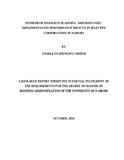| dc.contributor.author | Cheboi, Charles K | |
| dc.date.accessioned | 2012-11-13T12:36:19Z | |
| dc.date.available | 2012-11-13T12:36:19Z | |
| dc.date.issued | 2010 | |
| dc.identifier.uri | http://erepository.uonbi.ac.ke:8080/handle/123456789/5367 | |
| dc.description.abstract | Enterprise Resource Planning (ERP) is an important system in organizations since it links departmental functions and ensures that information is available and shared across the entire organization. Literature reveals that a properly implemented system is able to transform the way in which organizations operate, though there were some instances where this was not achieved.
The purpose of the study was to assess post-implementation impacts of ERP adopting organizations using ERP Scorecard benefits evaluation framework developed by Chand et al. The other general objectives were to assess and report on the six (6) ERP lifecycle stages. Relevant information relating to ERP available in literature was presented. The study used multiple-case study research design in order to provide in-depth analysis of the research objectives.
The sample that was studied consisted of four (4) organizations which were selected judgmentally intended to cover key sectors of the economy. Both qualitative and quantitative data was obtained from face-to-face interview with key people involved in the implementation of ERP's which was then analyzed and performance impact determined. The information was presented in the form of chart, tables and narrative comparative explanations in order to validate the objectives of the research. | en_US |
| dc.language.iso | en_US | en_US |
| dc.publisher | University of Nairobi, Kenya | en_US |
| dc.title | Enterprise resource planning: assessing post-implementation performance impacts in selected corporations in Nairobi | en_US |
| dc.title.alternative | Thesis (MBA) | en_US |
| dc.type | Thesis | en_US |

